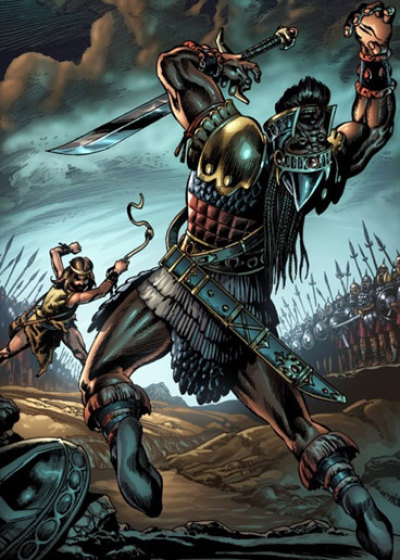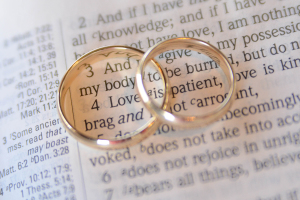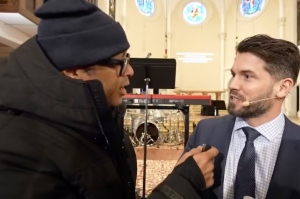Defeating the giant of fear: Lessons from David

I once read an article in the Huffington Post that said 85% of the things we’re afraid of never happen. And of the 15% that happens, we often discover we can handle it better than we thought we could or we learn something from the experience.
Still, many of us live with fears. While some measure of healthy fear can be helpful, fear is also one of the most destructive human emotions. When fears become irrational, they can paralyze us or cause us to panic. We often learn these fears as children, and we carry them with us throughout our lives.
But did you know the commands “fear not” or “do not be afraid” are given 63 times in Scripture, with a total of 300 variations of those phrases between the Old and New Testaments?
One of my favorite biblical stories about facing fear is the story of David and Goliath. I think there are four lessons we can learn from this story about fear and how we should deal with it.
Fear is intimidating
Picture the scene. There are two hills on either side of the Valley of Elah, which is about a mile wide. The army of Israel was on one hill, and the army of the Philistines was on the other hill. One day, a massive man presents himself to the Israelites. His name is Goliath, and he is a champion from Gath, a Philistine city.
According to Scripture, Goliath’s height was “six cubits and a span.” Six cubits and a span is anywhere from 8 ½ feet to 9 ½ feet tall. There are some translations of the Old Testament that offer different renderings of Goliath’s stature. If you read the Masoretic text, the Septuagint, the Dead Sea Scrolls or the writings of Flavius Josephus, they don't say Goliath was “six cubits and a span.” They say he was “four cubits and a span,” which would make him about 6 feet, 9 inches tall. And he wore a coat of chain mail that weighed about 125 pounds and carried a spear with a head like a pointed sledgehammer.
In B.C. 1000, when this story takes place, the average height of an Israeli male was 5 feet, 3 inches. Goliath standing next to an Israelite would be like LeBron James standing next to Danny DeVito — it would be almost comical if it wasn’t so frightening.
At the time, King Saul was the tallest Israelite, and he was considered the best contender against Goliath. But evidently, he didn’t speak up and no one forced the issue. King Saul was just as afraid of Goliath as everybody else. Except David, a shepherd and the youngest son of Jesse.
When David brought supplies to his brothers who were at the frontlines against the army of the Philistines, he heard Goliath’s taunts and said, “Who is this uncircumcised Philistine, that he should defy the armies of the living God?” (1 Samuel 17:26b).
David didn’t see a giant. He saw a big bully. And a big target.
When we look at people, we automatically size them up. We are either impressed or not impressed. If they outdress us, outsmart us or outwork us, or whatever the case may be, we might feel a little fearful and intimidated. But what we see is often a matter of how we see.
Fear is a barrier to knowing God and fulfilling his purpose for our lives. David wasn’t quaking in fear of Goliath because he trusted in the living God. And when we place our trust in God, our fears become less frightening.
Fear can be debilitating
Goliath taunted the army of Israel for 40 days, morning and evening. It would be demoralizing to hear that, day after day. Eventually, Goliath crossed the little brook in the Valley of Elah. He wasn’t just intimidating — he was aggressive. And he was getting closer.
So, the two armies prepared for a face-off in the valley. But when Goliath appeared once more, the army of Israel hastily retreated in “great fear” (1 Samuel 17:24).
Goliath was much like our adversary, Satan. As the apostle Peter writes, “Your adversary the devil prowls around like a roaring lion, seeking someone to devour” (1 Peter 5:8b). Fear is one of his most effective weapons against the people of God.
If we allow fear to take root in our lives, it can grow out of control, keeping us awake at night, plaguing our thoughts, and causing us to ask, “What if?” over and over again. Soon, our fears become debilitating.
When our fears threaten to overwhelm us, we should recall the words of David: “The Lord who delivered me from the paw of the lion and from the paw of the bear will deliver me from the hand of this Philistine” (1 Samuel 17:37a).
Fear breeds squabbling.
When David showed up with food for his older brothers, who were fighting in Saul’s army, Eliab, his oldest brother, went into a rage.
“Why did you come down here?” He asked David. “And with whom have you left those few sheep in the wilderness?” (1 Samuel 17:28). This is a dig. Eliab’s trying to put David down: “I’m in the army. All you do is keep sheep.”
Eliab, Jesse’s oldest son, stood in line with his other brothers when the prophet Samuel came to anoint the next king — which means Eliab was the first one in the family to be rejected as king. He never forgot that. And he never forgot when David came in from tending his sheep, and Samuel said David was the chosen one. Eliab held that against David. In a moment of fear, he lashed out.
Mental health expert Kristen Fuller once said that fear can turn into anger. When you're in a stressful environment combined with a perceived threat, you can experience frustration. In that condition, people often lash out at those around them. Keep in mind if people are getting angry at you, it could be because they’re afraid of something.
Instead of getting into a fight with Eliab, David walked away. He knew who the real enemy was. If we aren’t careful, we can end up spending all our time fighting with a Christian brother or sister, while the real enemy of our souls is gaining ground. He wants you distracted by infighting. Don’t let it happen.
Fear requires conquering
When it became apparent that no one would fight Goliath, David stepped forward with a sling and five stones. He said to Goliath, “You come to me with a sword, with a spear, and with a javelin. But I come to you in the name of the Lord of hosts, the God of the armies of Israel, whom you have defied” (1 Samuel 17:45).
I don't think this was hubris or that David was being prideful. I think he was probably nervous when he met Goliath. But David realized something:
God was fighting his battle.
David continued:
“This day the Lord will deliver you into my hand, and I will strike you and take your head from you. And this day I will give the carcasses of the camp of the Philistines to the birds of the air and the wild beasts of the earth, that all the earth may know that there is a God in Israel. Then all this assembly shall know that the Lord does not save with sword and spear; for the battle is the Lord’s, and he will give you into our hands” (1 Samuel 17:46-47).
And we all know what happened next.
David was victorious because he did three things:
He remembered past victories. God had shown himself strong in the past (with lions and bears), so David knew God would be strong in the present. Fear in the present is conquered by recalling victories in the past.
He realized personal assets. Goliath was huge compared to David, and he believed that his size, his words, his armor, and his weapons would allow him to conquer the Israelites. David was small and chose to forgo Saul’s offer of armor, and his only weapons were a sling and five stones. David knew that God would defeat Goliath, so he only used what God had provided. Find the gifts God has given you and use them.
He relied on a powerful God. From an outsider’s view, David’s task looked impossible. But David realized Goliath was attacking not just an army, but God’s people. When God’s people are attacked, God takes it personally. Goliath may have had size, strength, and a sword, but David came in the name of the Lord. If you’re going to slay giants, then you must have a healthy respect for the size of the living God, particularly in comparison to the size of your problem.
Fear is the greatest barrier to us fulfilling God’s plan for our lives. But God hasn't given us a spirit of fear, because “perfect love casts out all fear” (1 John 4:18). I'm praying that we who follow Jesus would not only be a bold church but that we would also be a church of sound mind, thinking clearly and unafraid. I pray that we would realize that the name, reputation, and authority of God is so much grander and much more powerful than any Goliath.
Skip Heitzig is the senior pastor of Calvary Church in New Mexico and is the author of numerous books and publications. His radio and television broadcast, Connect with Skip Heitzig, is available throughout the United States and around the world.



























